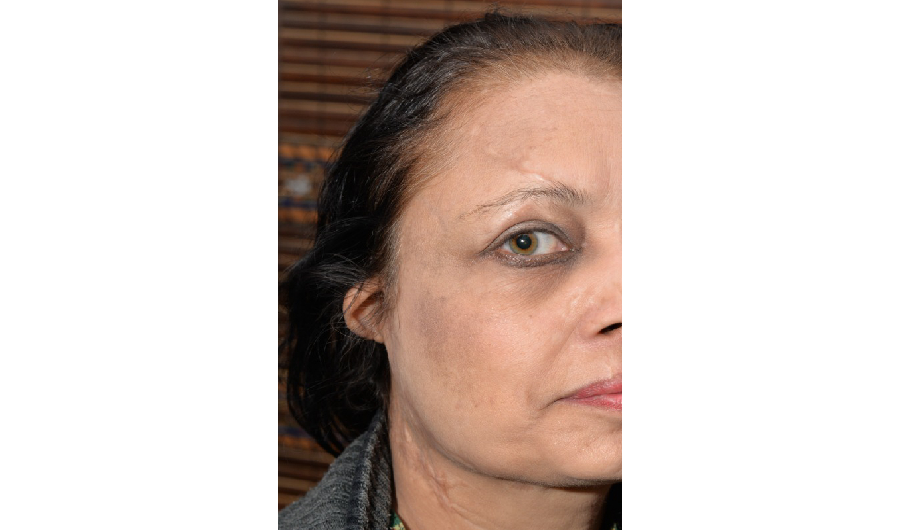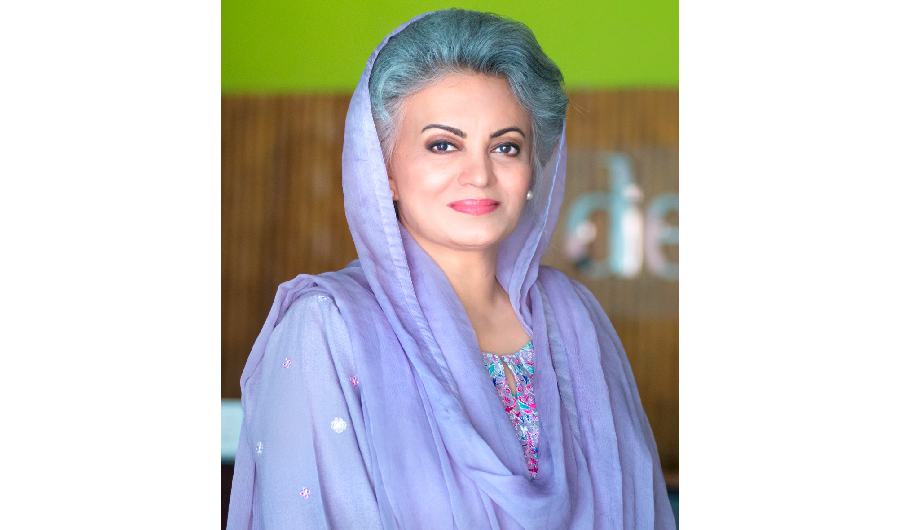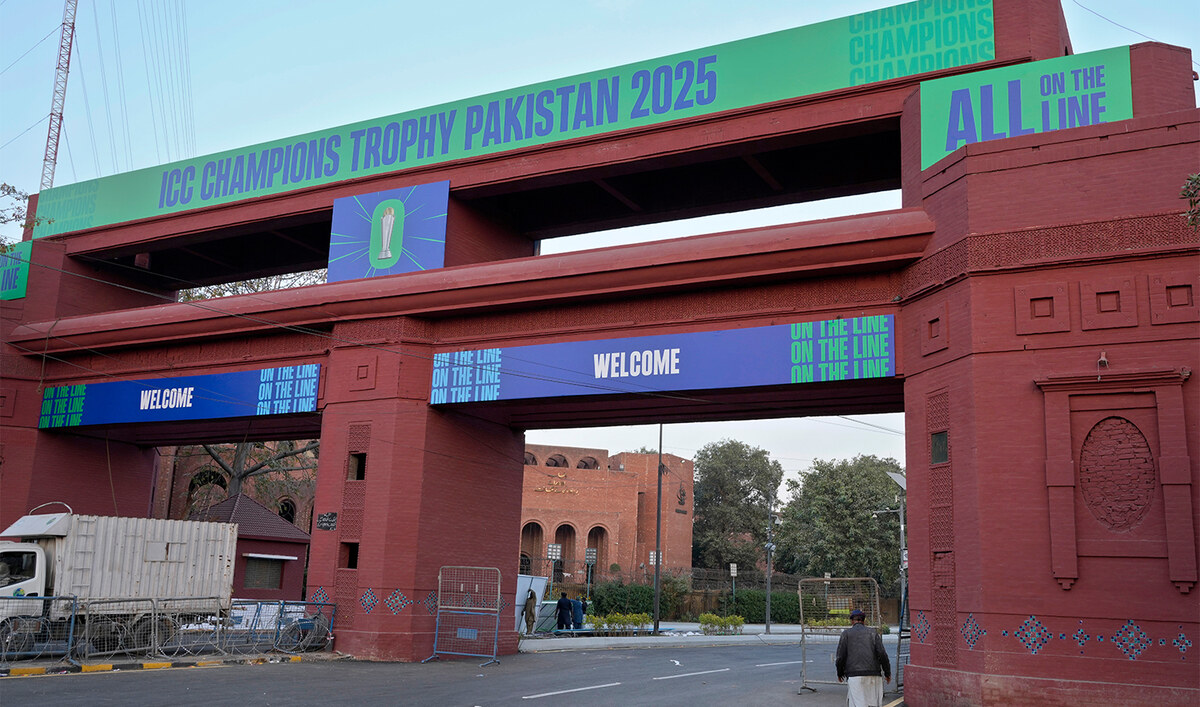LAHORE: Pakistan’s eastern Punjab province has committed Rs. 100 million to help survivors of acid and burn attacks undergo rehabilitation and come “back to life,” Chief Minister Usman Ahmed Khan Buzdar told Arab News.
Dozens of people, mainly women, and girls are disfigured in acid attacks every year in the Muslim majority country of 208 million people, although it is estimated many cases go unreported. Acid attacks in the country hit an all-time high in 2014, with 153 reported cases.
Perpetrators are usually husbands and family members, and in a 2018 Thomson Reuters survey of global experts, Pakistan ranked fifth for the highest rates of non-sexual violence in the world, including domestic abuse, with acid attacks often used as a means of punishing alleged transgressions.

Parveen Javed's husband first doused her with acid and then tried to hack away her legs with a machete. (Date: August 28, Lahore) (Photographer Natasha Mohamamd Zai)
This year, under its ‘Nai Zindagi’ program, the provincial budget for Punjab included the extension of medical aid and rehabilitation access to 1000 survivors. The program is yet to be implemented, but if successful, could help victims of acid violence re-enter society.
“It’s our (the government’s) job to help bring these women back to life,” Chief Minister Buzdar told Arab News in reply to written questions shared over email.
“The government’s duty doesn’t just end the moment a criminal is arrested or when justice is served. We, as representatives of the public, are tasked to bring these women out of the trauma they have experienced,” he said.
The stories of victims are eerily similar. Often, men who want to punish women for rejecting a marriage proposal or sexual advances deface them for life by dousing them in sulfuric acid, an inexpensive liquid easily available over the counter.
The government’s proposed plan, slated to roll out before the end of the year, is expected to cover the cost of surgical procedures and provide technical learning, offer no-interest loans, and fix a monthly stipend of between Rs. 2,000 ($13) to Rs. 5,000 ($32) for victims.
But activists working with survivors say rehabilitation for victims requires a long-term and much more expensive commitment.

The acid melted parts of Parveen Javed's right ear, neck, shoulders, arms and her back. (Date: August 28, Lahore) (Photographer Natasha Mohammad Zai)
“A single procedure, such as skin grafting, can cost over Rs. 60,000 ($383),” Masarrat Misbah, CEO of the Lahore based Smile Again Foundation, which finances acid attack survivors, told Arab News.
“Some women need 30 to 35 surgeries over many years to look better,” she said and added that the monthly stipend the Punjab government was proposing, was a bare minimum amount.
“What the government plans to offer is not enough. Nowadays, you cannot find a decent one-bedroom place on rent for less than Rs. 15,000,” Misbah said.
In 2011, the Acid Control and Acid Crime Prevention Bill was passed by Pakistan’s parliament to impose stiffer sentences for perpetrators. Since then many more people have been convicted of the crime, but crucial, additional legislation was still required, activists said, to include free access to medical care, rehabilitation and legal aid for survivors.
Previous governments in Punjab kept promising to legislate on the matter, but no progress was made.
“Since the last eight years, the departments keep on sending the bill to each other, sadly,” said Valerie Khan, chairperson of the Acid Survivors Foundation (ASF), but added that the proposed Punjab government initiative was a “great step.”
“Economic empowerment is crucial for most survivors as the majority of them live below the poverty line,” she said.

Masarrat Misbah, CEO of the Smile Again Foundation, which helps victims fund their reconstruction surgeries. (Provided by the Smile Again Foundation)
Acid attack survivor Parveen Javed, 45, went through four surgeries after her husband threw corrosive chemical at her face and then attempted to hack her legs with a machete in 2010. Since then, Javed has been unable to resume work as a caretaker.
“People either stare at my scars or are frightened by them,” she said. “Some jobs require me to stand for long hours but my legs are still too weak.”
Javed receives Rs. 15,000 ($95) every month in aid from the Smile Again Foundation of which Rs. 5,000 goes toward buying painkillers and anti-depressants.
According to the ASF, there has been a 50 percent reduction in acid assaults since 2014, though survivors continue to be pressurized into pardoning culprits.
Maryam Ashraf, 21, was set on fire by members of her husband’s family after an argument over household chores. At the hospital, Ashraf was forced to tell the police that her clothes caught fire by accident.
“I am tired of being dependent on other people,” Ashraf, who now lives with her brother, told Arab News. “I want to be independent. If the government gives me a loan, the first thing I will do is buy a house.”
For now, groups working with acid attack survivors are uncertain the money the government has proposed will be enough to cover basic living and rehabilitation.
But these concerns could have been addressed, insist the ASF and Smile Again Foundation, had the Punjab government included them in the drafting of the program.
“We already have the data of the 1000 women the government wants to help,” Misbah said. “We have done half their work, and yet we are not part of the planning process.”

















